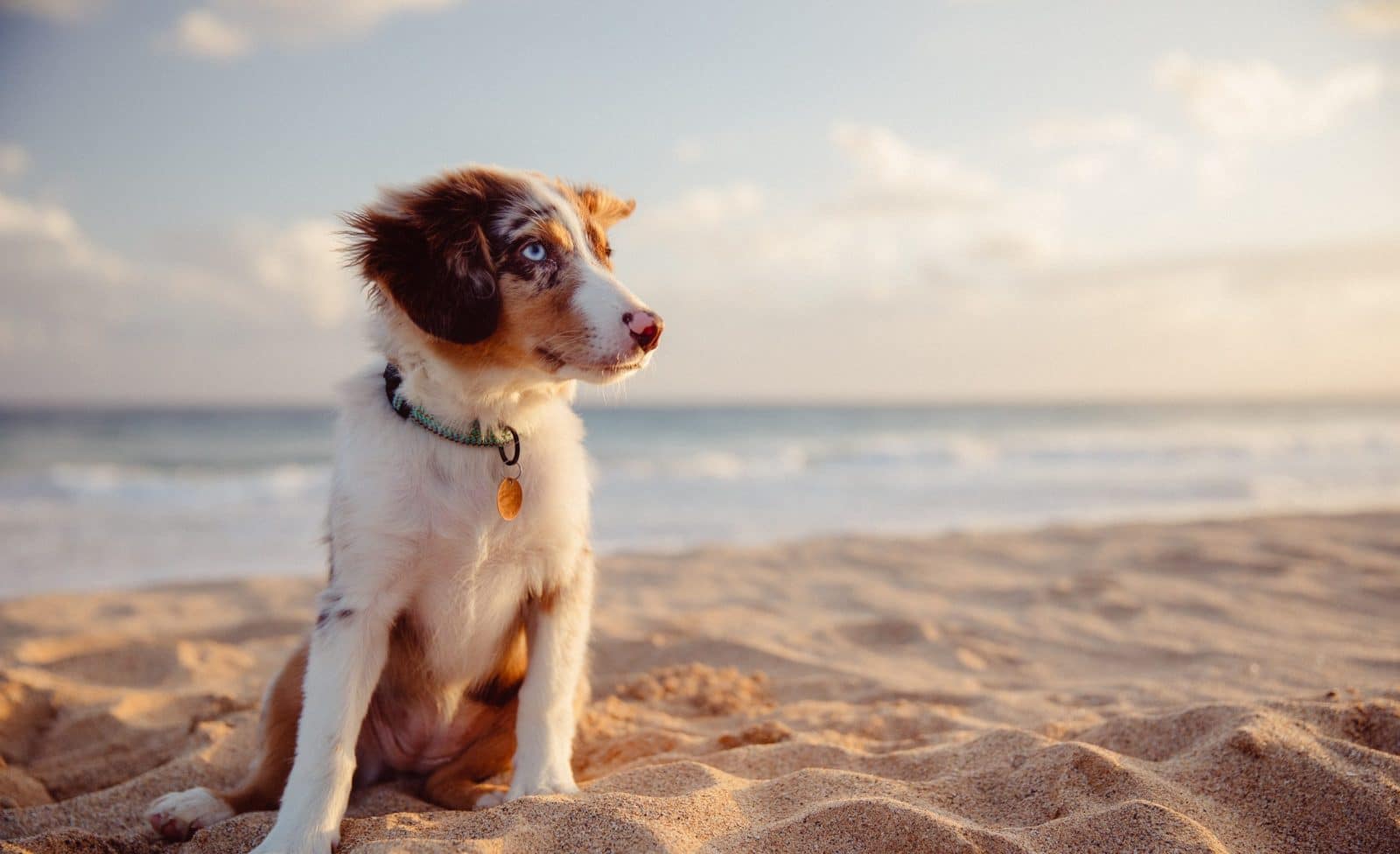Blog Keeping Your Dog Safe at the Beach
The beach can be a multi-sensorial experience for your dog, just romping around on the sand, chasing the waves or simply soaking the sun rays on a cozy blanket, may surely make him happy. However, as a loving, caring owner, you must be aware of some potential dangers in order to keep your dog safe at the beach and spend a happy and uneventful time.
At a first look, the beach may look like a pretty safe haven for your dog: the sand is soft, there are no cars and you are always there to supervise him. Yet, sometimes with the best intentions, accidents may happen.
Following are some guidelines to protect your pooch and safeguard your joyful moments:
1) Prevent Heat Stroke
As you may already know, dogs may tolerate heat to a less extent than we humans do. Unlike us, dogs do not perspire (other than a bit from their paw pads) so they must rely on their cooling system which consists of panting. Trouble begins to start when this cooling system is altered by high humidity, physical over exhaustion and high temperatures. Generally, if the temperature outside is much more hotter than the dog’s internal temperature, panting will not help the dog cool off, leading to hyperthermia and therefore, heat stroke.
Symptoms to be wary of are the following: excessive panting, difficulty and noisy breathing, bright red gums and tacky saliva. As the heatstroke progresses the dog will worsen and its gums will become pale, walking may be difficult with a staggering gait, the dog will reach high temperatures, develop bloody diarrhea and eventually will succumb if not treated in time.
2) Avoid Over Exertion
Most dogs will have a blast on the beach and will run back and forth or go swimming. However, these actions may cause heat stroke. Fortunately, most dogs will retreat to a shadowed area after romping around a bit to cool off. Yet, often dogs that are hyperactive may not listen to their need to retreat because they have too much pent up energy. This may cause heat stroke. If your dog is over doing it, call him to you and allow him to relax a bit next to you in a shady area. Please remember that dogs may over heat even when in the water, especially when the water temperatures are over 75 degrees.
3) Provide Hydration
The best way to prevent heatstroke is to keep your dog in a shady area with lots of water. Bring along a bottle of frozen water from home to give frequently in little sips if possible. A well hydrated dog has skin that is elastic and springs back quickly when lifted over the shoulder blades. .
4) Prevent Sun Burn
Dogs that present white muzzles and white ears or that are entirely white coated or very light in color have a higher tendency to develop sunburn. Human sun tan lotions should be avoided all together because they contain chemicals that may be toxic if licked off. Such dogs should be kept in the shade or a veterinarian-approved sun lotion should be applied.
5) Watch for Sand in the Eyes
Dogs like to romp around in the beach, roll in the sand and play all day long. It is easy for sand granules to go in the eyes and cause pain, weeping and redness. It may help to flush the eye with some water (not salt water of course), however, if problems continue the eye should be seen by the veterinarian because there are chances of the sand scraping the cornea’s surface causing a potential corneal ulcer.
6) Watch for Hot Sand
At times, the sand may be quite hot during the scorching afternoon hours. Your dog’s sensitive paw pads may hurt and easily burn. Also, carry your dog if feasible if there is a stretch of asphalt from the car to the the beach.
7) Prevent Eating Sand
Some dogs may resort to eating some sand at the beach. This can cause an upset stomach because the sand may be irritating to the stomach, but in some cases, when a lot of sand is ingested it may cause a serious intestinal impaction.
8) Prevent Eating Shells/Starfish/Stones
These can potentially cause choking, intestinal blockages if swallowed in large chunks or whole, or they can cause injury as they pass through the gastro-intestinal system. Watch as well for other stuff such as fish hooks, algae, dead sea gulls or the alike.
9) Prevent Drinking Salt Water
Drinking a lot of salt water may cause sickness because of the bacteria found in it and/or because the high salt content may throw the dog’s electrolytes off balance causing nausea and vomiting. In some cases, when too much water is consumed, the dog’s sodium levels may rise causing severe dehydration and even death. Too much salt water may aslo cause a case of beach diarrhea. Here is a fatal report from the past, all dog owners should keep in their mind: Swim kills family pet
10) Prevent Drowning
Dogs may be great swimmers but domestication may have slowed dogs down a bit on their great swimming skills. There are reports each years of dogs drowning, so it is best to keep dogs near the shore and not allow them to go too deep.
Conclusion
As seen, there are still some dangers even in the most unexpected places but learning about dog beach dangers can help you take preventive measures to protect your dog. Simply keep an eagle eye on your dog, keep him cool, give lots of bottled water and have fun!
Click here to learn more about Dog Safe at the Beach

